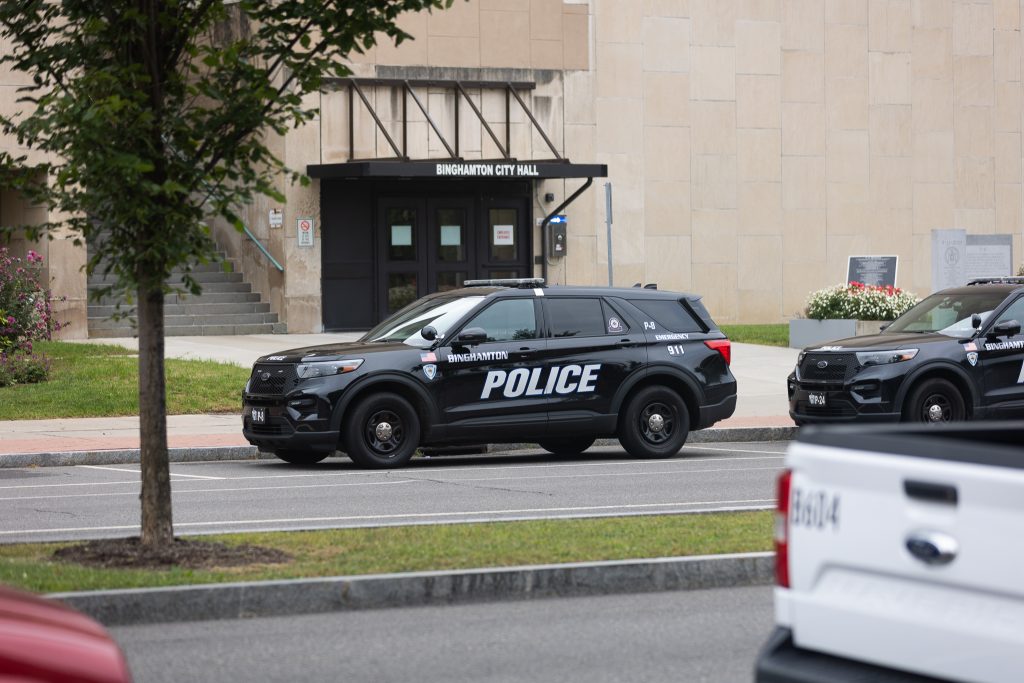Mayor Jared Kraham’s proposed legislation targeting the illicit sale of cannabis products is projected to help regulate unsafe consumption in the city of Binghamton.
On Oct. 22, Kraham proposed a new law permitting stricter law enforcement against illegitimate cannabis sellers. The law would establish an “Unlicensed Cannabis Activity” chapter in the city’s code, calling for rigid inspection of stores and premises suspected of selling unregulated and potentially harmful cannabis products, especially those adjacent to schools, places of worship and other youth facilities. The City Council will vote on the legislation in a future business meeting.
Following the legalization of cannabis in New York state in March 2021, state and local authorities have taken action against illegal “sticker shops” — a term coined for stores that sell stickers and other tokens at the same value as a cannabis product and then exchange the sticker for this product to avoid suspicion.
“Earlier this year, New York state granted local governments increased powers to regulate and enforce against the unlicensed marketing and sale of cannabis products,” Deputy Mayor Megan Heiman wrote in an email. “This local legislation, proposed by Mayor Kraham, outlines that increased enforcement authority for the city of Binghamton.”
New York’s Office of Cannabis Management — established following the legalization of cannabis in New York — is projected to have inspected and closed nearly 1,000 suspect establishments. Kraham’s goal is to locally implement this enforcement mechanism.
“As Mayor, I support the legal cannabis industry,” Kraham said in a press release. “However, we must not tolerate the sale of unsafe and illegal cannabis products in our community. These unregulated shops are stealing from taxpayers and putting consumers at risk with unknown, untested and untaxed products. People who patronize these unlicensed shops may be getting ripped off or buying products that are dangerous. Product is being sold to minors. In order for the legal cannabis industry to be successful in New York — and to protect residents and neighborhoods — we must continue to crack down on unlicensed operators.”
The new law would permit Binghamton police to conduct more stringent inspections into suspect activity — and in extreme cases, lead to the closure of stores deemed a safety threat. Law enforcement could also close retailers cited multiple times for violations like selling to minors or violent activity.
Illicit retailers have previously been handled by the statewide Office of Cannabis Management. In April, Gov. Kathy Hochul unveiled a measure to expand municipalities’ enforcement authority against illegal cannabis businesses provided that they mirror state power.
“By cracking down on unlicensed cannabis sales, this legislation aims to limit the amount of unregulated and potentially unsafe products going to consumers,” Heiman wrote.
The consumption of untested, unregulated cannabis materials heightens the risk that consumers may ingest laced and contaminated products. While no known cases of fentanyl-laced cannabis — a widespread concern — have been verified, some unlicensed retailers sell synthetic cannabinoids — which are often illegal and contain unknown, potentially harmful chemicals.
In addition to health and safety implications, the illegal sale of cannabis can impact taxpayers. Cannabis retailers must pay 13 percent retail taxes on the sale or transfer of cannabis products in New York and an additional 9 percent wholesale excise tax on the sale of cannabis products from a distributor to a dispensary. Damien Cornwell — the president of the Cannabis Association of New York and owner and founder of local cannabis dispensary Just Breathe — described how illicit cannabis retailers avoid taxes.
“[Illegal stores] significantly impact[s] the amount of money that comes back into the state for retail sales of cannabis,” Cornwell said. “It also significantly impacts the proposed plan, or the amount of money that would be reinfused into our local communities. Because if unregulated sales continue to happen, that might easily circulate back in because they get it through taxes, and so people don’t pay the same taxes if they’re not regulated stores.”



